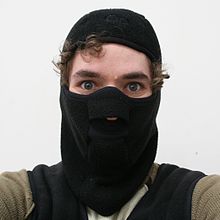balaclava
Appearance
See also: Balaclava
English
[edit]
Alternative forms
[edit]- Also called balaclava helmet.
Etymology
[edit]From the city of Balaklava in Crimea, from Ottoman Turkish بالقلاوه (modern Turkish balıklava), alteration of بالقلاغه (balıklaga, “fishing ground”). During the Crimean War the British troops suffered from cold due to improper clothing. When the news spread in the home front after the Battle of Balaclava in 1854, the people began knitting warm clothing for the soldiers, including woollen caps to be worn under the helmet, which were named balaclavas by the troops.
Pronunciation
[edit]Noun
[edit]balaclava (plural balaclavas)
- A type of warm headgear covering the neck, head, and often part of the face, with apertures left as necessary, often made out of wool.
- (chiefly UK, Canada) A ski mask with holes for the eyes and, sometimes, the nose and mouth, which may be rolled up and worn like a toque or pulled over the face for greater protection.
- 1969 January 10, “Robbed seven banks, Balaclava Bill given 15-year term in jail”, in Globe and Mail, Toronto, page 1:
- George Ronald Waite, 33, known as Balaclava Bill because of the dark blue woollen hood he wore while robbing seven banks of $46,200 over the past two years, was sentenced yesterday to 15 years in Kingston Penitentiary.
Derived terms
[edit]Translations
[edit]headgear
|
Italian
[edit]Alternative forms
[edit]Noun
[edit]balaclava f (plural balaclave)
Portuguese
[edit]Noun
[edit]balaclava f (plural balaclavas)
- balaclava (headgear)
Categories:
- English terms derived from Ottoman Turkish
- English 4-syllable words
- English terms with IPA pronunciation
- English terms with audio pronunciation
- Rhymes:English/ɑːvə
- Rhymes:English/ɑːvə/4 syllables
- English lemmas
- English nouns
- English countable nouns
- British English
- Canadian English
- English terms with quotations
- en:Headwear
- English terms derived from toponyms
- Italian lemmas
- Italian nouns
- Italian countable nouns
- Italian feminine nouns
- it:Headwear
- Portuguese lemmas
- Portuguese nouns
- Portuguese countable nouns
- Portuguese feminine nouns
